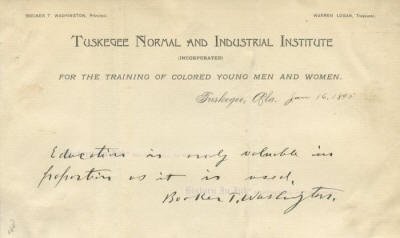1007349
Booker T. Washington
The pioneer African-American educator writes of the value of education
Booker Taliaferro Washington, 1856-1915. African-American educator and leader. Autographed Sentiment Signed, Booker T. Washington, one page, 8¼" x 5", on stationery of the Tuskegee Normal and Industrial Institute, Tuskegee, Alabama, January 16, 1895.
Washington, the foremost African-American figure of his time and the leader of the last generation of African-Americans born in slavery, writes of the importance of using one's education: “Education is only valuable in proportion as it is used."
Significantly, this piece is dated in 1895, the year of Washington's speech at the Atlanta Cotton States and Industrial Exposition in which Washington laid the groundwork for what became known as the "Atlanta Compromise." The Compromise was an agreement between African-American leaders and Southern white leaders under which Southern African-Americans would work meekly and submit to Southern White political rule, while Southern whites would guarantee that African-Americans would receive basic education and due process of law. In his speech, Washington tacitly endorsed segregation, arguing that African-Americans and whites could co-exist as fingers on a hand. His position was criticized by W.E.B. DuBois, who saw Washington as too non-confrontational and insufficiently committed to social and political equality for African-Americans.
Washington led the Tuskegee Normal and Industrial Institute from 1881, when he was but 25 years old, until his death. He skillfully navigated the political realities of social segregation in the Jim Crow-era South, promoting education for African-Americans while arguing that they could gain social equality by ”industry, thrift, intelligence and property." He assembled a coalition of African-Americans and liberal whites, including ministers, educators, editors, and businessmen. He attracted the attention and respect of political leaders, including Presidents Theodore Roosevelt, who hosted him at the White House, and William Howard Taft. He garnered the moral and financial support of white philanthropists such as Henry H. Rogers of Standard Oil, Julius Rosenwald of Sears, Roebuck & Co., George Eastman of Kodak, and Anna T. Jeanes. As later historians have described him, Washington "advised, networked, cut deals, made threats, pressured, punished enemies, rewarded friends, greased palms, manipulated the media, signed autographs, read minds with the skill of a master psychologist, strategized, raised money, always knew where the camera was pointing, traveled with an entourage, waved the flag with patriotic speeches, and claimed to have no interest in partisan politics. In other words, he was an artful politician." Booker T. Washington Rediscovered 209 (Michael Scott Bieze & Marybeth Gazman, eds., 2012).
This piece comes from a large collection of letters, notes, and signatures assembled by a professor of penmanship at the State Normal School at Emporia, Kansas, now Emporia State University, who had his students write to prominent men and women to request a handwritten letter expressing a reminiscence, a favorite sentiment, or a word of advice.
Washington has written this note on the upper portion of a sheet of stationery from the Tuskegee Institute. The bottom portion has been removed along the horizontal mailing fold below his signature. The piece has two vertical mailing folds and mounting traces on the back from prior mounting in the professor's album. It is in fine condition.
Unframed.
_____________
This item has been sold, but
click here to see other
American History items
that we are offering.





